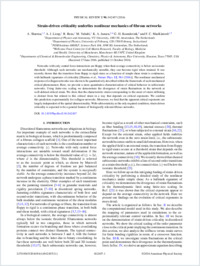Strain-driven criticality underlies nonlinear mechanics of fibrous networks
- Sharma, Abhinav Department of Physics and Astronomy, VU University, Amsterdam, The Netherlands - Department of Physics, University of Fribourg, Switzerland
- Licup, A. J. Department of Physics and Astronomy, VU University, Amsterdam, The Netherlands
- Rens, R. Department of Physics and Astronomy, VU University, Amsterdam, The Netherlands
- Vahabi, M. Department of Physics and Astronomy, VU University, Amsterdam, The Netherlands
- Jansen, K. A. FOM Institute AMOLF, Amsterdam, The Netherlands - Wellcome Trust Centre for Cell-Matrix Research, Faculty of Biology, Medicine and Health, University of Manchester, UK
- Koenderink, G. H. FOM Institute AMOLF, Amsterdam, The Netherlands
- MacKintosh, F. C. 1Department of Physics and Astronomy, VU University, Amsterdam, The Netherlands - Departments of Chemical & Biomolecular Engineering, Chemistry, Physics & Astronomy, Rice University, Houston, Texas, USA
-
11.10.2016
Published in:
- Physical Review E. - 2016, vol. 94, no. 4, p. 042407
English
Networks with only central force interactions are floppy when their average connectivity is below an isostatic threshold. Although such networks are mechanically unstable, they can become rigid when strained. It was recently shown that the transition from floppy to rigid states as a function of simple shear strain is continuous, with hallmark signatures of criticality [Sharma et al., Nature Phys. 12, 584 (2016)]. The nonlinear mechanical response of collagen networks was shown to be quantitatively described within the framework of such mechanical critical phenomenon. Here, we provide a more quantitative characterization of critical behavior in subisostatic networks. Using finite-size scaling we demonstrate the divergence of strain fluctuations in the network at well-defined critical strain. We show that the characteristic strain corresponding to the onset of strain stiffening is distinct from but related to this critical strain in a way that depends on critical exponents. We confirm this prediction experimentally for collagen networks. Moreover, we find that the apparent critical exponents are largely independent of the spatial dimensionality. With subisostaticity as the only required condition, strain-driven criticality is expected to be a general feature of biologically relevant fibrous networks.
- Faculty
- Faculté des sciences et de médecine
- Department
- Département de Physique
- Language
-
- English
- Classification
- Physics
- License
-
License undefined
- Identifiers
-
- RERO DOC 278700
- DOI 10.1103/PhysRevE.94.042407
- Persistent URL
- https://folia.unifr.ch/unifr/documents/305285
Statistics
Document views: 86
File downloads:
- pdf: 176
